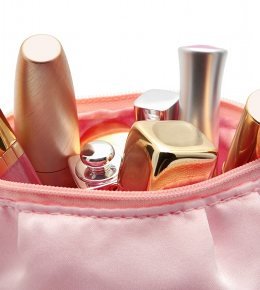Hair, perfume and beauty products are essential (no arguments there!), but many contain controversial ingredients called parabens.
We investigated the p-word to see what all the hoopla is about, and if you really need to toss that paraben-laced lipstick.
What are Parabens?
Parabens are chemicals that act as preservatives to extend the shelf life of some of our favorite products by preventing bacterial growth. The most common parabens are:
- methylparaben
- propylparaben
- ethylparaben
- isobutylparaben
- butylparaben
Look for the very small letters at the bottom of the back label. While common in cosmetics, parabens are also found in cleaning supplies, dental products and food items, some of which claim to be organic or all natural.
So What’s the Problem?
When we use a product on our skin, part of it is absorbed into our blood stream. Researchers are trying to determine the effect when synthetic preservatives soak into the skin. Controversy sparked when a 2004 study by the University of Reading in the U.K. revealed parabens in human breast tumors. The study was able to detect the chemical’s presence, but unable to determine that parabens caused the tumor. Other researchers maintain that there haven’t been enough studies to show the effects of long-term use of parabens, but they’re looking into claims that they lead to weight gain, skin aging and cancer.
According to Mayo Clinic cancer specialist Dr. Timothy Moynihan, “Some reports have suggested that products contain harmful substances such as aluminum compounds and parabens that can be absorbed through the skin. No clinical studies have yet given a definitive answer to the question of whether these products cause breast cancer. But the evidence to date suggests these products don’t cause cancer.”
According to the FDA, “The Cosmetic Ingredient Review (CIR) reviewed the safety of methylparaben, propylparaben and butylparaben in 1984 and concluded they were safe for use in cosmetic products at levels up to 25%. Typically parabens are used at levels ranging from 0.01 to 0.3%.”
Paraben Free
If you choose to avoid parabens, there are many foods and cosmetics that don’t contain these preservatives. Some big name brands that have committed to being paraben-free include Burt’s Bees, Aveda and Tom’s of Maine, but there are many others. To inspect which brands may have parabens, check the Environmental Working Group’s Cosmetic Safety Database.

